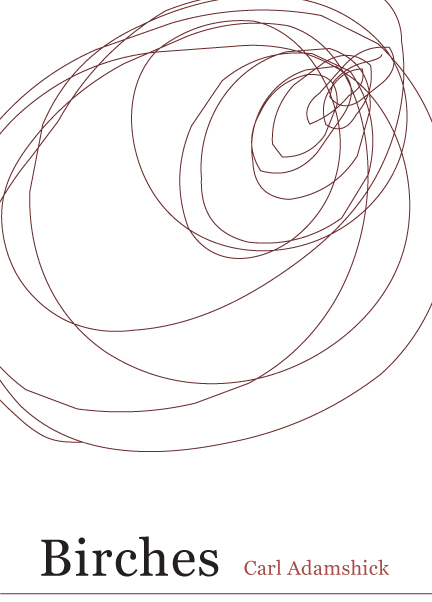
paper • 88 pages • 15.95
ISBN: 978-1-945588-24-2
Brutal and tender, Adamshick’s spare poems recount a son’s unsentimental and powerful love for his mother, while contemplating, in the wake of her death, what it is to be truly alive.
An excerpt from “ARMISTICE” in Birches
…My mother’s bed was in the center
of the living room. Her morphine,
a viscous blue liquid I dropped
on her tongue. In the evenings,
Billie Holiday eased herself
out of the speakers and then sat
her voice down quietly
in the lamplight. I wanted
the nurses, regardless
of gender or age, to hold me
in the dark, to lie with me
on a bed of forgetfulness.
Many of them said:
It’s okay. She did it for you,
now you can return the favor.
It’s the same. But one nurse said:
It is not the same.
…It’s impossible to read this book without faltering, without staggering. The title of black snow that visits us again and again throughout the book has the invocation of Celán’s black milk, and in the ecstatic silence of the work as a whole, one feels the haunted presence of Nelly Sachs— two masters whose works limn the edges of suffering. Like them, Adamshick cuts himself against that edge, and with his wound re-enters the world with the ruinous knowledge of the tragic hero: if this is the world / why don’t I know / where my body ends. Read the full review.
…’His bicycle/ black on the grass/ black on the towpath/ one pedal dug into the earth/ black in the fallen leaves.’ Adamshick’s poems are most compelling in moments like this, in which an image stands on its own, generating possibilities for interpretation…..
Carl Adamshick’s Birches is a bracing gorgeous threnody not sung but spoken in brief poems that recount a son’s unsentimental love for a mother as he tends to her through her dying. The linked sequence of poems navigates the shifting boundaries with a fearless clarity that derives from reckless, compelling, and deeply original figuration: ‘Soon she will walk through the front/ door in her chest,’ Adamshick writes. ‘Sometimes, I picture her/ as light, a zoo of light.’ That tenderness here is brutal, recalling the ways love puts us at risk. Reading this book throws me into existential loneliness heightened by its utterly human intimacies; these intimacies come from the details of a material world transformed into grief, as in poems that speak of black snow, a leather chair ruined by a dog, ashes on a shelf. These true and surreal details are vivid and in their vividness almost spiritual: ‘Under the tree/ wind falls through my hair./ You were a place, mother.’ Irresolvable contradictions transform pain into truth and back again. The nights here are tenuous and frail, shuttling between a young man’s commitment to a mother in irrevocable decline and his desire for life, sex, plenitude, celebrations with friends, magnolias. Despite, or even perhaps because of its moments of humor in the midst of pathos, this book wrecks me, and calms me, and is an apologia for love, its intimacies made into art. It is also deeply human, arguing in poems of enormous beauty that ‘ we share what it means to live’ when ‘it’s evening in the box of the world.’
Carl Adamshick’s new poems watch over his dying mother. Ornament has been stripped from this collection called Birches. Need drives the poems—a need to tell the truth, a need to fix in time what can never be fixed: life. Adamshick’s great talent and concision with his art bear down every line. The poems say: ‘I’m alive./ I find that undeniable/ and my mother is what we have come/ to define as dead./ She remains in that noun/ like the moon remains itself.’ At time it feels Adamshick is picking up where James Wright left off: Midwestern yet worldly, transcendent, ecstatic rather than confessional. I am grateful for the book. I marvel how the work holds and honors this mother for us, refining her into something genuine and lasting: what other art does that more clearly than poetry?